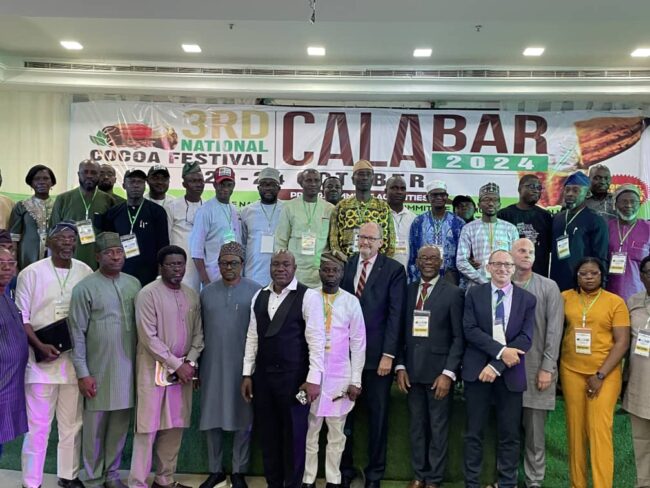The Cocoa Farmers Association of Nigeria (CFAN) has urged the government, traditional leaders, and local communities to foster youth engagement in cocoa farming, processing, and management through entrepreneurship initiatives in order to ensure the sustainability of cocoa production in Nigeria.
The Association’s National President, Adeola Adegoke, shared this message with reporters in Calabar on Thursday during the celebration of the 3rd National Cocoa Festival, held in Cross River State’s capital.
He explained that this year’s festival theme aimed to address compliance with the European Union’s Deforestation Regulations (EUDR) in Nigeria and emphasized the importance of youth involvement through entrepreneurship for the cocoa sector’s sustainability.
Adegoke expressed delight in welcoming everyone to the festival, highlighting Calabar’s status as Nigeria’s second-largest cocoa-producing state. “This festival signifies another achievement and a blessing from our Creator, allowing us to celebrate this wonderful occasion today,” he stated.
He emphasized that cocoa plays a crucial role in livelihoods, revenue generation, and job creation. “This festival provides an invaluable opportunity for industry stakeholders to network and foster developmental sustainability in the cocoa sector,” he added.
Adegoke noted that the previous two National Cocoa Festivals took place in Akure, Ondo State, and Abuja, leading to the selection of Calabar as the venue for this year’s event.
He appreciated the support from Cross River State’s Governor, Senator Bassey Edet Otu, the Executive Director of ICCO, Mitchel Arrion, and various stakeholders who partner to address environmental challenges and implement EUDR, aiming to attract more investments into the cocoa industry.
Governor Otu, represented by Hon. Johnson Ebokpo, the Commissioner for Agriculture and Irrigation Development, congratulated CFAN on organizing the festival and selecting Cross River as the host state. He outlined a strategic seven-year plan focusing on improving the cocoa market system and sustainability.
Otu remarked, “Cross River faces significant microeconomic challenges, and we have designated cocoa as a key driver of our economic development. We are implementing policies to enhance cocoa value.”
He mentioned that the state currently produces between 58,000 and 62,000 tons of cocoa annually, cultivated over 123 hectares, with an average yield of 300 to 370 kilograms per hectare. The state is also revising existing produce laws to enhance value addition at primary and secondary levels, creating jobs and attracting foreign investment in the cocoa sector.
Chairing the event, Daniel Asukwo, a former Member of the House of Representatives, stated, “Today, we come together not only to celebrate our cocoa industry’s successes but also to deliberate and establish a sustainable future for a sector that has been a source of pride for Nigeria’s agricultural economy.”
He noted the festival’s theme is especially timely as the cocoa industry faces numerous challenges both domestically and globally. Despite Nigeria’s historical position as the second-largest cocoa exporter and a key player in the global cocoa economy, various factors are hindering productivity and market presence.
“The cocoa sector suffers from outdated farming practices, limited access to quality seedlings, inadequate infrastructure, and insufficient technological investment,” Asukwo added.
He highlighted that compliance with new international regulations like the EUDR presents more challenges for farmers who are already struggling to meet export standards.
Furthermore, the depreciation of the naira against major currencies has raised the costs of imported inputs, such as fertilizers and equipment, leading to lower profit margins for cocoa farmers, which threatens their livelihoods and the future of the cocoa industry.
ALSO READ THESE TOP STORIES FROM NIGERIAN TRIBUNE
Port Harcourt helicopter crash: All eight passengers feared dead — Police






